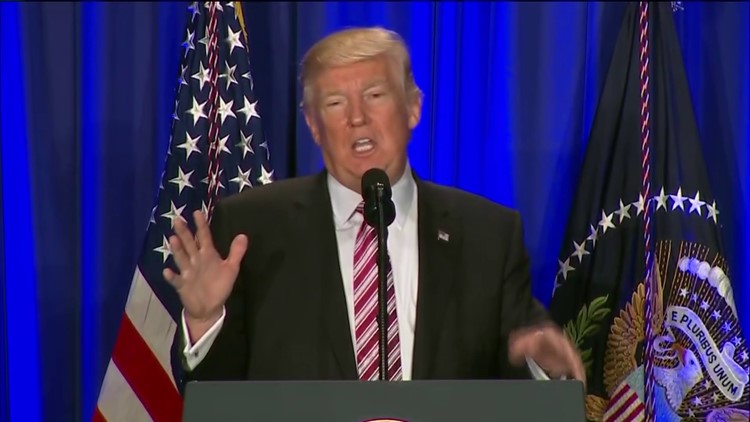WASHINGTON — President Donald Trump signed two executive actions Friday at the Department of Defense, including one that suspends indefinitely admissions for Syrian refugees and limits the flow of other refugees into the United States by instituting what the President has called “extreme vetting” of immigrants.
Titled “Protection Of The Nation From Foreign Terrorist Entry Into The United States,” the executive order would start to make good on Trump’s promise to tighten borders and halt certain refugees from entering the United States.
The text of the order — in a break from drafts that had been circulating earlier this week — drops a longtime Trump campaign pledge to establish safe zones in Syria to give Syrian nationals displaced by the ongoing civil war in the country a place to relocate.
The order bars all persons from certain terror-prone countries from entering the United States for 90 days and suspends the US Refugee Admissions Program for 120 days until it is reinstated “only for nationals of countries for whom” members of Trump’s Cabinet deem can be properly vetted.
As of Friday night, White House officials would not list those terror-prone countries.
“I hereby proclaim that the entry of nationals of Syria as refugees is detrimental to the interests of the United States and thus suspend any such entry,” the order signed by Trump reads.
The total number of refugees admitted into the United States would also be capped during the 2017 fiscal year at 50,000, down more than half from the current level of 110,000.
“I am establishing new vetting measures to keep “radical Islamic terrorists” out of the United States of America,” Trump said during the signing at the Pentagon after the swearing-in of Defense Secretary James Mattis. “We don’t want them here.”
He added, “We want to ensure that we are not admitting into our country the very threats our soldiers are fighting overseas. We only want to admit those into our country who will support our country and love deeply our people.”
At the Pentagon, Trump met privately for about an hour with Mattis, Vice President Mike Pence, Security Adviser Mike Flynn and military officials and they discussed accelerating the defeat of ISIS, confronting global threats like North Korea, military readiness and the National Guard, a Defense official told CNN. The meeting took place in “the tank,” secure room where the Joint Chiefs meet.
Trump also signed a second executive action on Friday that would spur military spending and, as Trump said, “begin the great rebuilding of the Armed Services of the United States.”
The President added that the executive action instructs Mattis to begin “developing a plan for new planes, new ships, new resources and new tools for our men and women in uniform.”
Trump’s order on refugees has been something the White House has been considering for days and the President was seen with the document on his Air Force One desk Thursday when he flew to Philadelphia.
Prioritizing Christians over Muslims
By signing the measures, Trump is making good on his promise to block Syrian and certain other refugees from entering the United States and his murkier pledge of banning Muslim immigration into the United States, a vow that his aides have walked back as being directed at countries seen as terror hotbeds.
The order also gave the Department of Homeland Security leeway to prioritize refugee claims made by people “on the basis of religious based persecution” as long as the person applying for refugee status is “a minority religion in the individual’s country of nationality.”
This would make it easier for Christians and other religious minorities in majority Muslim countries from entering the United States than it would for Muslims in general.
Trump did not back away from the idea that he is prioritizing Christians over Muslims in an interview with the Christian Broadcast Network taped before he signed the measures on Friday.
“We are going to help them,” Trump said about persecuted Christians. “They’ve been horribly treated. Do you know if you were a Christian in Syria it was impossible, at least very tough, to get into the United States? If you were a Muslim you could come in, but if you were a Christian, it was almost impossible and the reason that was so unfair, everybody was persecuted in all fairness, but they were chopping off the heads of everybody but more so the Christians. And I thought it was very, very unfair.”
Trump did not cite a reason or offer any evidence about why the agencies that vet refugees, including the Department of Homeland Security and the State Department, would have prioritized Muslim refugees over Christians.
Democrats blasted Trump’s move — despite not having the text of the documents — arguing that while it may not ban all Muslims from entering the United States, it still is discriminatory.
“Make no mistake — this is a Muslim ban,” Sen. Kamala Harris, a Democrat from California, said in a statement.
“Tears are running down the cheeks of the Statue of Liberty tonight as a grand tradition of America, welcoming immigrants, that has existed since America was founded has been stomped upon,” Senate Minority Leader Chuck Schumer said in a statement. “Taking in immigrants and refugees is not only humanitarian but has also boosted our economy and created jobs decade after decade. This is one of the most backward and nasty executive orders that the president has issued.”
The American Civil Liberties Union also called Trump’s action “just a euphemism for discrimination against Muslims.”
“Identifying specific countries with Muslim majorities and carving out exceptions for minority religions flies in the face of the constitutional principle that bans the government from either favoring or discriminating against particular religions,” American Civil Liberties Union Executive Director Anthony Romero said in a statement.



